Increased levels of COX-2 and prostaglandin E2 contribute to elevated aromatase expression in inflamed breast tissue of obese women
- PMID: 22576212
- PMCID: PMC3398487
- DOI: 10.1158/2159-8290.CD-11-0241
Increased levels of COX-2 and prostaglandin E2 contribute to elevated aromatase expression in inflamed breast tissue of obese women
Retraction in
-
Retraction: Increased Levels of COX-2 and Prostaglandin E2 Contribute to Elevated Aromatase Expression in Inflamed Breast Tissue of Obese Women.Cancer Discov. 2021 May;11(5):1306. doi: 10.1158/2159-8290.CD-21-0224. Cancer Discov. 2021. PMID: 33947719 Free PMC article. No abstract available.
Expression of concern in
-
Editor's Note: Increased Levels of COX-2 and Prostaglandin E2 Contribute to Elevated Aromatase Expression in Inflamed Breast Tissue of Obese Women.Cancer Discov. 2019 Aug;9(8):1142. doi: 10.1158/2159-8290.CD-19-0724. Cancer Discov. 2019. PMID: 31371325 No abstract available.
Abstract
Obesity is a risk factor for hormone receptor-positive breast cancer in postmenopausal women. Estrogen synthesis is catalyzed by aromatase, which is encoded by CYP19. We previously showed that aromatase expression and activity are increased in the breast tissue of overweight and obese women in the presence of characteristic inflammatory foci [crown-like structures of the breast (CLS-B)]. In preclinical studies, proinflammatory prostaglandin E(2) (PGE(2)) is a determinant of aromatase expression. We provide evidence that cyclooxygenase (COX)-2-derived PGE(2) stimulates the cyclic AMP (cAMP) → PKA signal transduction pathway that activates CYP19 transcription, resulting in increased aromatase expression and elevated progesterone receptor levels in breast tissues from overweight and obese women. We further demonstrate that a measure of in-breast inflammation (CLS-B index) is a better correlate of these biologic end points than body mass index. The obesity → inflammation → aromatase axis is likely to contribute to the increased risk of hormone receptor-positive breast cancer and the worse prognosis of obese patients with breast cancer.
Significance: We show that obesity-associated inflammatory foci in the human breast are associated with elevated COX-2 levels and activation of the PGE2 → cAMP → PKA signal transduction pathway resulting in increased aromatase expression. These findings help to explain the link among obesity, low-grade chronic inflammation, and breast cancer with important clinical implications.
Conflict of interest statement
A.J. Dannenberg is a member of the Scientific Advisory Board of Tragara Pharmaceuticals, Inc., a company that is developing a selective COX-2 inhibitor. The other authors disclosed no potential conflicts of interest.
Figures
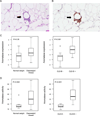
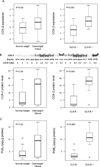
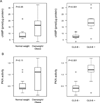
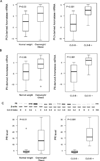
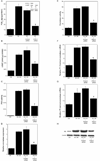
Comment in
-
The role of the PGE2-aromatase pathway in obesity-associated breast inflammation.Cancer Discov. 2012 Apr;2(4):308-10. doi: 10.1158/2159-8290.CD-12-0078. Cancer Discov. 2012. PMID: 22576207
-
Findings of Research Misconduct.Fed Regist. 2023 Sep 13;88(176):62800-62803. Fed Regist. 2023. PMID: 37736072 Free PMC article. No abstract available.
-
Findings of Research Misconduct.Fed Regist. 2023 Sep 13;88(176):62803-62807. Fed Regist. 2023. PMID: 37736073 Free PMC article. No abstract available.
References
-
- van Kruijsdijk RC, van der Wall E, Visseren FL. Obesity and cancer: the role of dysfunctional adipose tissue. Cancer Epidemiol Biomarkers Prev. 2009;18:2569–2578. - PubMed
-
- Bulun SE, Lin Z, Imir G, Amin S, Demura M, Yilmaz B, et al. Regulation of aromatase expression in estrogen-responsive breast and uterine disease: from bench to treatment. Pharmacol Rev. 2005;57:359–383. - PubMed
-
- Irahara N, Miyoshi Y, Taguchi T, Tamaki Y, Noguchi S. Quantitative analysis of aromatase mRNA expression derived from various promoters (I.4, I.3, PII and I.7) and its association with expression of TNF-alpha, IL-6 and COX-2 mRNAs in human breast cancer. Int J Cancer. 2006;118:1915–1921. - PubMed
-
- Cancello R, Henegar C, Viguerie N, Taleb S, Poitou C, Rouault C, et al. Reduction of macrophage infiltration and chemoattractant gene expression changes in white adipose tissue of morbidly obese subjects after surgery-induced weight loss. Diabetes. 2005;54:2277–2286. - PubMed
Publication types
MeSH terms
Substances
Grants and funding
LinkOut - more resources
Full Text Sources
Other Literature Sources
Medical
Research Materials

